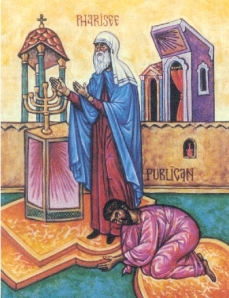by Phillip Cary, Ph.D.
Synergism is just a Greek way of saying “co-operation,” which in turn is just a Latin way of saying “working together.” Paul uses the corresponding Greek verb when he describes himself and his colleagues as “co-working” (2 Cor. 6:1) with God as ambassadors for Christ, through whom God urges people to be reconciled to himself (ibid., 5:20). Monergism, a much more recent term, means to work alone, having no co-worker. So monergists are those who think that in some respect God works alone.
The crucial question is: in what respect? The standard Protestant view is monergism with respect to justification: God alone renders us just or righteous in his sight, without our co-operation. But most Protestants would add that sanctification is a co-operative enterprise in which our will and work have a necessary role to play, working together with the grace of God. So most Protestants are monergists about justification but synergists about sanctification. And since justification by faith alone is all that is necessary for salvation, most Protestants are also monergists about salvation.
Of course in order to be thoroughly monergist about justification one must also be monergist about the faith by which we are justified, understanding it to be a divine gift resulting from grace alone and not from human work. Luther, in effect, insisted on this type of monergism when he excoriated the medieval nominalist notion of “congruent merit,” according to which sinners work to acquire the gift of “first grace” (meaning roughly, the gift of conversion and true faith) by praying as well as they can, trying their best to “do what is in them” (facere quod in se est) even without grace. The term “synergism” seems to have come into use for the position rejected by the Lutheran orthodox theologians when they reaffirmed Luther’s doctrine in the Book of Concord in 1580 (see especially article 2). Later, Calvinists used it to describe the Arminian position that our free will has an independent role to play in accepting the gift of grace. Synergism, for both Lutherans and Calvinists, means the teaching that grace does not simply cause us to have faith, but rather makes an offer of salvation which it is up to us to accept or reject. Both Lutherans and Calvinists reject this synergism, and thus can aptly be labeled monergists with respect to the gift of faith.
The question of whether Augustine is a monergist or a synergist is more complicated. For one thing, even at his most monergistic, Augustine does not deny that we are active in our own salvation. Augustine is a monergist with respect to the origin of faith, for instance, in that he sees it as resulting from prevenient or “operating grace” rather than “co-operating grace” (his terms). But for Augustine this does not take away the role of human free will, for what prevenient grace does is precisely to move our wills so that they freely will the good. Hence for Augustine grace never undermines or replaces free will. In that sense he is never a radical monergist, as if the human will had no active role to play. On the other hand, he is indeed a monergist in a less radical sense, because for him the gift of faith is wholly the work of God, since even our freely willing to accept God’s gift is a work of grace alone.
So in that sense, Augustine is clearly a monergist with respect to the gift of faith, unlike the Arminians. Ultimately it is up to God, not us, whether we freely choose to accept what God has to give us. However—and here is the real complication—this does not make Augustine a monergist with respect to salvation. The reason why is that Augustine does not have a Calvinist concept of saving faith. For he does not share Calvin’s distinctive new doctrine about the perseverance of the saints, according to which everyone with true (i.e., saving) faith is sure to persevere to the end and be eternally saved. For Augustine, you can have a perfectly genuine faith but not persevere in faith to the end of your life. There is no guarantee that believers will not lose their faith and thus ultimately be damned. Hence no matter how true your faith presently is, that does not mean you are sure to be saved in the end. Consequently, Augustine’s monergism about faith does not make him a monergist about salvation.
About salvation Augustine is a synergist, explicitly drawing a contrast between “operating grace” (i.e., the grace that works in us), which is monergistic in its granting the gift of faith, and co-operating grace (i.e., the grace that works with us), with which we are co-workers in the journey of faith, hope and love by which we come to eternal life in the end. In Calvinist terms, Augustine is a synergist about sanctification like most Protestants, but because he thinks sanctification is necessary for salvation unlike most Protestants, he ends up being also a synergist about salvation—despite being a monergist about faith.
A good illustration of Augustine’s distinction between operative and co-operative grace is the late treatise On Grace and Free Will, 33. Addressing the issue of how a person comes to love God (in Calvinist terms, the issue of sanctification rather than justification) he asks, “Who was it that had begun to give him his love, however small, but He who prepares the will and perfects by his co-operation [synergism!] what He initiates by his operation [monergism]? For in beginning [i.e. in the initial choice to have faith, from which charity springs] He works in us that we may have the will, and in perfecting works with us when we have the will.” In Augustinian terms: prior to any co-operation of our will, operative grace produces faith (i.e., a good will) in us, then from faith springs charity, which works together with the (co-operating) grace of God in the journey to eternal life. In Calvinist terms, again, this amounts to monergism about faith, but synergism about salvation.
However, as I mentioned above, there is a radical sense of the term monergism in which Augustine is not a monergist at all. This is the sense in which “grace alone” excludes any exercise of human free will, even one which is wholly a gift of prevenient grace. One reason often given for this radical monergism is a yet more fundamental monergism—call it “absolute monergism”—in which the answer to the question “monergism with respect to what?” is: “absolutely everything.” This amounts to a denial of the existence of what the Christian tradition calls second causes. It means that only God, the First Cause, has real power, and that neither human free will nor anything else in creatures is a real cause of anything that happens.
This absolute monergism could thus also be called “mono-causalism.” It is contrary not only to Augustine and the whole Catholic tradition, but also to the Westminster Confession, which teaches that the eternal decree of God by which he does “ordain whatsoever comes to pass” works in such a way that “neither is God the author of sin … nor is the liberty or contingency of second causes taken away, but rather established” (3.1; cf. also 5.2). The point of this teaching, which is couched in the language of Thomas Aquinas and agrees with his doctrine, is that God’s working in all things does not mean that creatures have no power to work, but rather that the creatures’ power, will and work derive from the work of God, and precisely for that reason are real, just like all God’s works. God’s primary causality therefore does not undermine or replace the secondary causality of creatures, including their free will. God has ambassadors, apostles and other servants with a will of their own and work to do, even while he is always indispensably at work in them. The two forms of causality are not incompatible or in competition with one another.
Mainstream Calvinism is thus at one with Catholicism in rejecting absolute monergism. The place to locate the difference between Catholicism and Calvinism concerning monergism is rather in the fact that the whole Roman Catholic tradition since Augustine is synergist about salvation. For Catholicism our works of love (made possible by operative grace in the beginning and aided by co-operative grace throughout) are necessary for salvation. That’s precisely the purport of Trent’s denial of the sola fide: faith alone is not enough for salvation without works of love (Decree on Justification, articles 10-11).
However, there is a division within Catholicism on the point about monergism with respect to faith. Whereas one important strand of Catholic theology, including Aquinas and the Dominican tradition, promotes an Augustinian monergism about faith, another strand, most powerfully represented by the 16th-century Jesuit Luis de Molina, defends a form of synergism about faith. Molinism is thus something like the Catholic form of Arminianism. In the De Auxiliis controversy around 1600, the Pope adjudicated between these two positions, decreeing that both were legitimate and neither side could accuse the other of heresy. This was of course not a relativist move: the two positions are probably irreconcilable, and if so then at least one of them is in error in some way. But the pope’s decree meant that such error is not heresy and does no harm to the faith, so the debate may continue but must do so in mutually respectful terms.
There is of course no one on earth to adjudicate between Catholics and Protestants. But perhaps it will help to be aware, at least, of the difference between absolute monergism and the more modest monergism about faith, justification and salvation which is the legacy of Luther and Calvin.
(Originally published 31 October 2006)
Dr Phillip Cary is Professor of Philosophy at Eastern University.
HT: Pontifications



